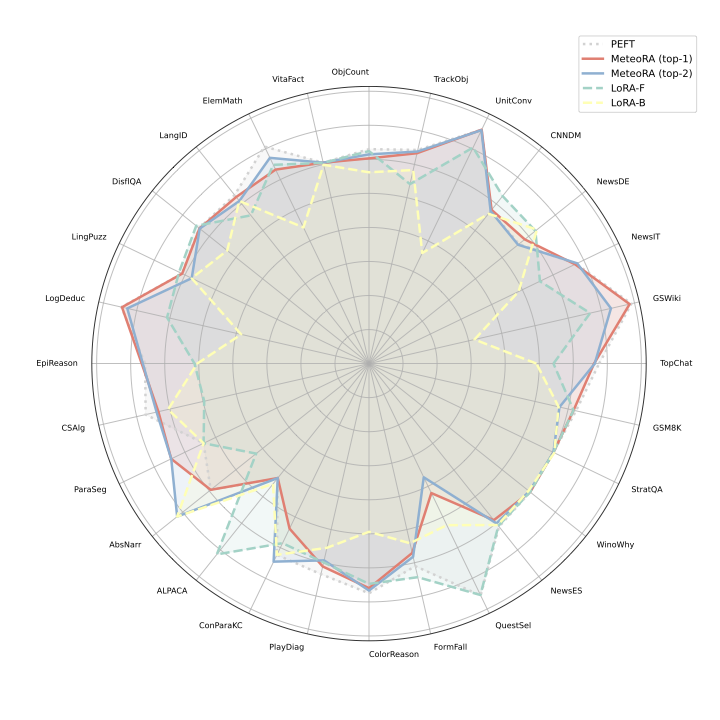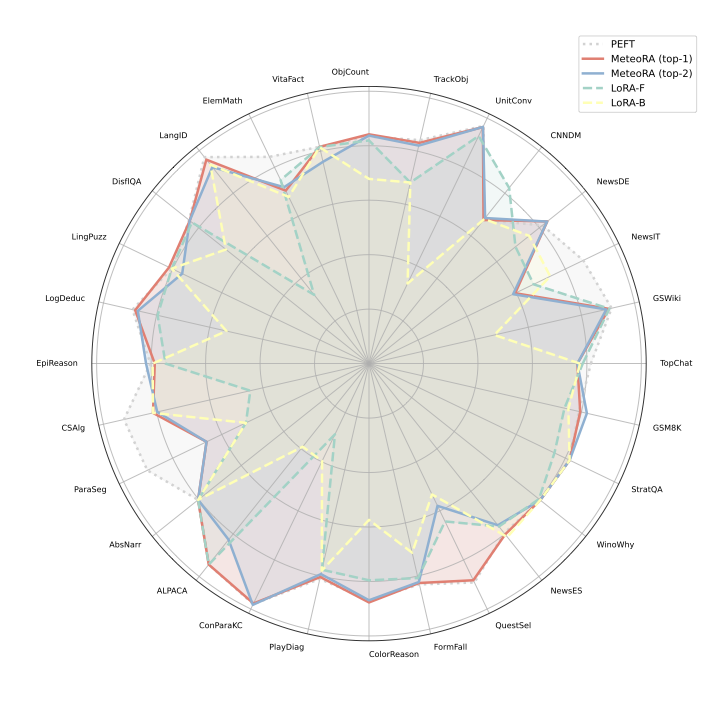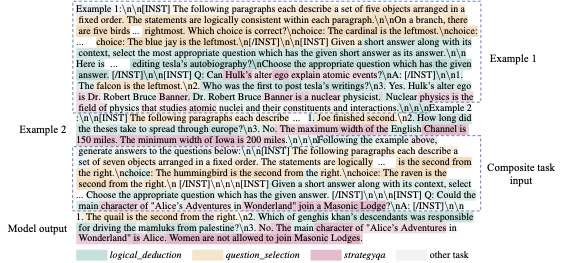MeteoRA: Multiple-tasks Embedded LoRA for Large Language Models
This repository contains the models used in the paper "MeteoRA: Multiple-tasks Embedded LoRA for Large Language Models".
The corresponding GitHub repository is MeteoRA.
Overal performance
General performance of MeteoRA embeded LLMs with 28 LoRA adapters
We successfully apply MeteoRA to both LlaMA2-13B and LlaMA3-8B. Each model equips 28 tasks embedded in 28 LoRA adapters, respectively. The performance of MeteoRA is comparable to the state-of-the-art. Refer to our paper for the detailed information of evaluation settings.
 |
 |
Example of composite-3 tasks
We highlight the statistically dominant LoRA selected by MeteoRA in token level (decoded to words). The result shows that LLM with MeteoRA could achieve timely LoRA switching on both phases of input understanding and output generation. The background color gets darker when Gating network assigns a higher weight value.
Directory structure
llama3_8b_lora_b: Contains one LoRA adapter fine-tuned with 28 tasks together in balanced-dataset mode (1,000 samples for each task).llama3_8b_lora_f: Contains one LoRA adapter fine-tuned with 28 tasks together in full-dataset mode.llama3_8b_meteora: Contains the LlaMA3-8b base model equipped with MeteoRA. Both top-1 and top-2 versions included.llama3_8b_peft: Contains 28 LoRA adapters fine-tuned for 28 tasks, respectively.
Usage
Preparation
Clone the GitHub repository MeteoRA.
Install necessary packages:
pip install -r requirements.txtPrepare the datasets. MeteoRA requires datasets in JSONL format. The tasks are primarily selected from the BIGBench dataset in the paper, which is in JSON format. To convert them to JSONL format, run:
cd data python create_dataset.py --task allTo create a specific dataset, use:
cd data python create_dataset.py --task <task_name>Prepare composite-n tasks. Refer to our paper for the definition of composite-n tasks. Generate these tasks using:
python create_composite.py --n <n>We prepared
n=3,n=5andn=10few-shot dataset generating code. Before generation, please ensure that the sub-tasks to composite composite-n task have been included indata/datasets.Prepare LoRA adapters and MeteoRA model checkpoints. You can train them yourself or download ours pre-trained models (MeteoRA with LlaMA2 and MeteoRA with LlaMA3 as base model):
python download_ckpt.pyUpdate file paths in
configs/config.yaml. Example paths:base_model_path: 'meta-llama3/Meta-Llama-3-8B' meteora_ckpt_path: 'ckpt/llama3_8b/llama3_8b_meteora/top_2' adapter_dir: 'ckpt/llama3_8b/llama3_8b_peft'
Evaluation
Run a benchmark with the MeteoRA model:
python eval_model.py --task <task_name> --batch_size <batch_size>
For example:
python eval_model.py --task composite_10 --batch_size 4
Note: For composite-n tasks, set a larger temperature value (self.T in MoELoRA/layer.py). Use 15, 20, and 30 for n=3, n=5, and n=10, respectively. For single tasks, use the default value (self.T=1).
To save the evaluation result:
python eval_model.py --task <task_name> --batch_size <batch_size> --save
For debug mode (model output and ground truth will be shown in the console):
python eval_model.py --task <task_name> --batch_size <batch_size> --debug
Run a benchmark with the PEFT model:
python eval_model.py --task <task_name> --batch_size <batch_size> --model <adapter_name>
Training the MeteoRA Model
Prepare LoRA adapters and corresponding datasets in JSONL format. Ensure each LoRA adapter has a corresponding dataset. Place all LoRA adapters and datasets in their respective folders with matching subfolder names:
- lora_adapters - adapter_name1 - adapter_name2 - ... - datasets - dataset_name1 - dataset_name2 - ...Update file paths in
run_meteora_train_fsdp.sh.Train the MeteoRA model:
sh run_meteora_train_fsdp.sh
Note: The current version of Triton acceleration supports inference mode only. Use the following settings when training the MeteoRA model:
export MOELINEAR_USE_ACCELERATE_FWD=0
export MOELINEAR_FWD_INNER_LOOP_MODE='batch'
export MOELINEAR_ACCELERATE_FWD_BACKEND='torch'
export MOELINEAR_ACCELERATE_FWD_BACKEND_TORCH_VERSION='v1'
Evaluation Results
composite-n results
The composite-10 evaluation results are presented in details with MeteoRA results on the left side and LoRA-B results on the right side of each metric column. A dash ('-') indicates that the corresponding metric was not applicable or included in the evaluation. Note that the 0.00 BLEU scores are caused by mismatch and too insufficient answers.
| Sub-task Name | Accuracy↑ (MeteoRA) | Accuracy↑ (LoRA-B) | BLEU↑ (MeteoRA) | BLEU↑ (LoRA-B) | ROUGE-1↑ (MeteoRA) | ROUGE-1↑ (LoRA-B) | ROUGE-2↑ (MeteoRA) | ROUGE-2↑ (LoRA-B) | ROUGE-L↑ (MeteoRA) | ROUGE-L↑ (LoRA-B) |
|---|---|---|---|---|---|---|---|---|---|---|
| logical_deduction | 0.500↑ | 0.453 | - | - | - | - | - | - | - | - |
| question_selection | 0.703↑ | 0.688 | - | - | - | - | - | - | - | - |
| abstract_narrative_understanding | 0.625↓ | 0.672 | - | - | - | - | - | - | - | - |
| goal_step_wikihow | 0.773↑ | 0.727 | - | - | - | - | - | - | - | - |
| winowhy | 0.422↑ | 0.078 | - | - | - | - | - | - | - | - |
| strategyqa | 0.461↑ | 0.211 | 3.23↑ | 0.00 | 0.225↑ | 0.106 | 0.051↑ | 0.025 | 0.210↑ | 0.099 |
| disfl_qa | 0.266↑ | 0.117 | - | - | - | - | - | - | - | - |
| news_commentary_de | - | - | 14.78↑ | 14.54 | - | - | - | - | - | - |
| alpaca | - | - | 0.00↓ | 8.17 | 0.257↑ | 0.187 | 0.075 | 0.075 | 0.241↑ | 0.167 |
| linguistics_puzzles | - | - | 17.37↑ | 12.14 | 0.233↑ | 0.189 | 0.052↑ | 0.030 | 0.176↑ | 0.103 |
Citation
If you use MeteoRA for your research, please cite our paper:
@misc{xu2024meteora,
title={MeteoRA: Multiple-tasks Embedded LoRA for Large Language Models},
author={Jingwei Xu and Junyu Lai and Yunpeng Huang},
year={2024},
eprint={2405.13053},
archivePrefix={arXiv},
}

